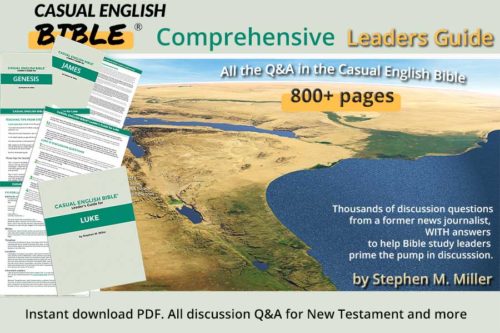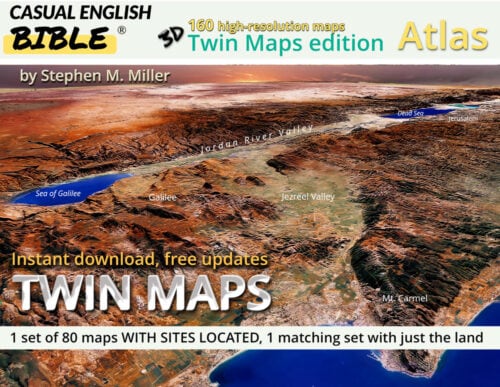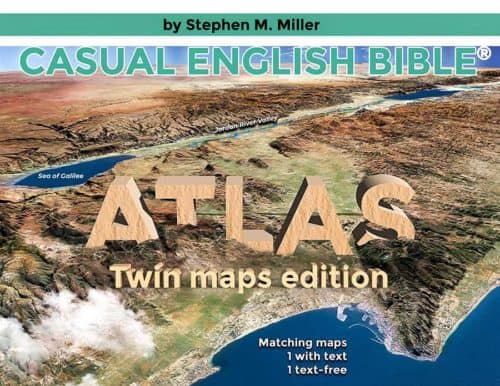Judges 13
Angel announces Baby Samson
It’s a boy
1Israel fell back into their bad habit of bad behavior. They did things the LORD said was wrong. So, the LORD turned the Philistines loose on them—for 40 years. 2At the time, a man named Manoah lived in the town of Zorah, [1] in Dan’s tribe. He married a woman who was unable to have children. So, they had none.3One day, the LORD’s angel [2] suddenly appeared to the woman and said, “I know you don’t have any children because you’re not able to. That’s about to change. You’re going to get pregnant and have a son. 4Listen carefully. Don’t drink wine or any other intoxicating drink. And stick to a kosher [3] diet.
5Here’s why. From the day this boy is born, you’re going to raise a little Nazirite [4] child into a man. Don’t ever cut his hair. He has a destiny to fulfill. He’s going to save Israel from the Philistines.”
Manoah invites the angel back
6The woman went right to her husband and said, “God sent a man to talk with me. His face was astonishing. He looked like an angel from God. I don’t know where he came from. I didn’t ask. He didn’t even tell me his name. 7But he told me, ‘You’re going to get pregnant and have a son. Don’t drink wine or any other intoxicating drink. And stick to a kosher diet. This is because you’re going to raise a son who will become a Nazirite devoted to God from the day he is born to the day he dies.’” 8Her husband Manoah prayed, “Please LORD, I’d like you to send your messenger back to us. We’d like him to tell us how we’re supposed to raise this boy.”Angel returns as tutor
9God heard Manoah. The angel came back to the woman while she was sitting in a field. Her husband wasn’t with her. 10She took off running to get him. She told him, “I was just with the man who came to me earlier. He’s back.”11Right away, Manoah got up and followed his wife. The man was still there, waiting. Manoah said, “Are you the one who talked with my wife?” The angel said, “Yes.” [5] 12Manoah said, “When everything happens that you said would happen, what are we supposed to teach the boy? What is he supposed to do with his life?” 13The angel said, “Your wife knows what I told her. She needs to carefully follow those instructions. 14She can’t eat or drink anything that comes from the vineyard. No wine. No other intoxicating drink. She can’t eat any food that is non-kosher—ritually unclean. She needs to do what I told her. All of it.”
A goat for an angel
15Manoah said, “Please, would you stay with us a while? Let us cook a young goat for you.” 16The LORD’s angel said, “I can stay a while, but I won’t eat your food. You can prepare it as a burnt offering [6] to the LORD, though. Manoah didn’t realize that this messenger was an angel sent from the LORD himself. 17Manoah asked the angel, “What’s your name? We want to remember it. And we want to honor you by name when the boy is born.” 18The angel said, “Why do you ask for my name? [7] I’ll tell you this: it’s extraordinary [8] and more wonderful than you could imagine.”A goat for God
19Manoah sacrificed the goat. He burned it on a rock altar along with a grain offering. [9] He presented both offerings to the LORD who does extraordinary things for his people. 20When the flames of the sacrifice rose into the sky, the angel of LORD stepped into the flames and rose out of sight. When Manoah and his wife saw this, they dropped to the ground, facedown. 21The LORD’s angel never came back. But Manoah finally realized this messenger had come from the LORD.Wife calms nervous husband
22Manoah told his wife, “We’re dead. We’ve seen God. We’re gonna die.” [10] 23But his wife said, “No, we’re okay. If the LORD wanted to kill us, he wouldn’t have accepted our burnt offering and our grain offering. And he wouldn’t have bothered giving us the message the angel just delivered. God wouldn’t waste his time like that.”24Manoah’s wife delivered a son. They named him Samson. [11] He grew up living a blessed life. It was obvious the LORD was on his side. [12] 25The LORD’s Spirit started nudging Samson to action at a place called Dan’s Camp, [13] between the cities of Zorah and Eshtaol. [14]
Footnotes
Zorah is about 15 miles (24 km) west of Jerusalem.
The Hebrew word mal’ak means “messenger” or “representative,” or “envoy.” In some stories, it’s hard to tell if the messenger is human or celestial. But in this case, the messenger doesn’t seem to come from this world (13:20).
See Leviticus 11 for a list of food the Israelites (and today’s observant Jews) could and couldn’t eat. No lobster, softshell crab, or steaks cooked rare. But they could pig out on baked grasshoppers, fried locusts, and wild honey. No pig, though.
Bible writers describe Nazirites as people who take “a special vow of devotion” to God (Numbers 6:2). “When you’re living under a Nazirite vow, devoted to the LORD, let your hair grow. Don’t touch a dead person…Stay ritually clean for as long as you devote yourself to God—for the duration of this special vow” (Numbers 6:5-6, 8). For Samson, the intended duration was a lifetime.
The one-word answer in Hebrew is ani. It can mean: I, me, myself, mine, yes. Essentially in this case, it means, “I’m the one.”
In a burnt offering, the entire creature is burned to ashes. How-to instructions for a burnt offering are in Leviticus 1. It was the most common offering in Israel, intended to atone for sinning. Jews have taught that in God’s eyes, sin was a capital offense. Jewish law, however, says God allowed them to substitute the death of an animal for the death they deserved. “Blood is what brings a body to life. I’ve given you blood to use exclusively on the altar. It atones for your sin—it gets rid of your guilt so you can stay on good terms with the LORD. Blood is the price of your sin” (Leviticus 17:11). The writer of Hebrews says the blood of Jesus was the last sacrifice needed; it paid the price for the sins of all people for all time (Hebrews 10:10).
That’s an odd question for the angel to ask, since Manoah had already explained why he wanted to know the man’s name. And that might be the point: Manoah thought the visitor was a man. He didn’t recognize an angel of God when the angel was standing right there in front of him. The intent of the angel’s question might have been something like this: “Fella, I just came from heaven to tell you that you’re going to have a son who will butt-kick the Philistines. And you’re asking me what my name is?”
The Hebrew word describing the angel’s name is pili. It means: wonderful, beyond understanding. It’s in the family of words Bible writers use to describe the extraordinary miracles of God during the Israelite exodus out of Egypt, and the way God comes to the rescue of his people, to save them from danger. The idea behind the word seems to track with the mission of Samson: “He’s going to save Israel from the Philistines” (13:5).
Grain offerings were expressions of gratitude for a harvest and for the way God takes care of the Israelites. People offered the grain in several ways: ground to fine flour, presented as baked, fried, cooked in a pot, or roasted with olive oil. For more about grain offerings see Leviticus 2:1-3; 6:14-18.
Manoah was at least half right. He probably didn’t see God. But if he had seen God, Bible writers said it would have killed him. God told Moses, “I need to warn you not to look at my face. Any human who looks directly at me will die” (Exodus 33:20). God didn’t tell Moses what it is about his full presence, face and all, that would kill a human being. God and other celestial beings are often described as glowing. If it’s a matter of physics, some might wonder if seeing God is like staring into the sun, but more dangerous. Yet, it might not be a matter of physics. Some scholars even question the authenticity of the story in which God warned Moses not to look at him. That’s because other stories report that Moses did, in fact see God face-to-face (Numbers 12:8). But other scholars say those other stories come later, after Moses had grown in his relationship with God. No answers here. But there sure are a lot more questions.
Samson’s name comes from two Hebrew words: semes, on. They mean: sun, little. He was Little Sun. And he probably lit up the life of his mom and dad…until he lit up the grain fields and orchards of the Philistines (Judges 15:4-5).
The writer doesn’t say how God blessed Samson.
It’s unclear what Dan’s Camp (Mahaneh-dan) was. It may have been the tribal headquarters of Dan. Or it may have been a landmark site, such as the first place the tribe camped after Joshua released the armies to go to their appointed territories (Judges 18:12).
Samson’s hometown of Zorah is about 15 miles (24 km) west of Jerusalem and Eshtaol is about 1.5 miles (2.4 km) east of Zorah.
Discussion Questions
- Sorry, there are currently no questions for this chapter.











